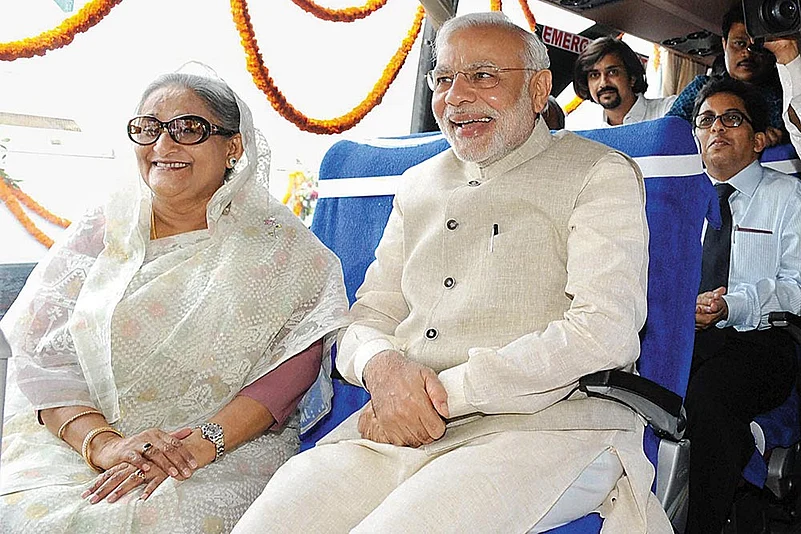It hovers perennially in the background, as if it’s the only real issue between India and Bangladesh. And the political rhetoric peaks every now and then within India. But all the internal hype over “illegal immigrants” notwithstanding, as a bilateral subject it’s sensitive and contentious and has hardly figured in official Indo-Bangladesh talks for over a decade, especially at the highest level.
Time To Cross The Bridge
Immigrants issue will lay a new path, but bilateral ties cannot afford to tilt

Much of this stems from the way Indo-Bangladesh relations have progressed in the last 10 years, especially since Sheikh Hasina’s Awami League came to power in 2008, turning Dhaka into one of New Delhi’s closest allies in South Asia.
Both Manmohan Singh’s UPA government in its two terms and its successor, Narendra Modi’s NDA regime, have seen value in fostering those ties, and have been practically indistinguishable in their stance towards Dhaka. Both have made every effort to strengthen relations in the past decade—and that has essentially meant taking a conscious decision to keep contentious issues off the talks-table.
However, the near-completion of the first draft of the National Register of Citizens in Assam makes a direct reckoning of the illegal immigrants issue unavoidable. This looms as an extremely delicate task ahead for the Modi government: how to find a balance between satisfying its domestic audience and ensuring the issue does not act as a spoiler in bilateral ties.
India shares its longest land boundary with Bangladesh: there’s a 4,096-km porous border between the two countries. Given the decades-old animus the immigrant issue has created in Assam, it may come as a surprise that it’s got one of the smaller borders with Bangladesh. The five Indian border-states rank thus: West Bengal (2,217 km), Tripura (856 km), Meghalaya (443 km), Assam (262 km) and Mizoram (180 km).
Bangladeshi officials say they are aware of what has been happening in Assam, but it has not yet figured in bilateral talks between the two sides. Also, till it’s brought up formally, it remains an internal process of India on which Bangladesh has no say. But the NRC draft will have a likely fallout: the possible detection/identification of people deemed to be “illegal immigrants from Bangladesh” will lead to the next step, a demand for deportation. Easier said than done, but the potential it holds of souring New Delhi-Dhaka ties is pretty high.
“We believe in crossing the bridge when we come to it. But there’s no doubt this certainly will become a major issue,” says a Bangladeshi official. Indian officials partly demur. They say the issue may not have come up in prime ministerial meeting and such like, where only broad contours of bilateral relations are discussed. But, they point out, immigration has been taken up at various levels in talks between officials, whose frequency and variety have gone up in recent years. According to Indian officials, in the absence of any acknowledgement of the problem or existence of “illegal immigrants” from Bangladesh into India, there has not been much progress on the subject.
“Bangladesh has always had the tendency of denying the existence of any of their nationals staying in India illegally,” says former foreign secretary Kanwal Sibal, who has participated in many such rounds of discussions during his tenure at the coveted post.
However, Sibal also points out that even if Bangladesh does accept prima facie that some of their nationals could be living in India illegally, their internal process of cross--verifying this is not only time-consuming but also invariably ends with an assertion opposite to what was said by India. Those identified by India as “illegal immigrants” are not Bangladeshi nationals, they invariably conclude.
The former foreign secretary feels it’s about time Bangladesh honestly accepts the problem of “illegal immigration” and cooperates with India to find ways to solve it. But will India be in a position to raise the issue with Bangaldesh now?
Next year-end, Bangladesh will be gearing up for its parliamentary elections and the time is not propitious for Dhaka to take a flexible approach. The Bangladesh Nationalist Party of Khaleda Zia, the main opposition party, anyway accuses Hasina of being generally pro-India and has been critical of her failure to get an agreement on Teesta waters. The Awami League is also trying to deal with anti-incumbency, especially among dissatisfied middle-class voters and social-media users for her alleged curbs on democratic rights in the name of fighting Islamic terrorism.
At a time when Bangladesh is busy dealing with over a million Rohingya refugees and miffed with India’s failure to pressure Myanmar to take back their people, while obsessing over 40,000-odd Rohingyas and their possible links with terror groups, the illegal immigrant issue can only come as a new irritant.
If New Delhi decides to weigh in heavy on the issue, it risks actively jeopardising the chances of Hasina to return to power and bringing in the BNP and its Islamic allies to power in its place, which would pose a more serious headache for Delhi.
But in the coming months, India will also start preparing for the 2019 Lok Sabha elections. All bets are off on which way Modi might want to lean while walking the tightrope between his domestic nationalist constituency and the ally in Dhaka.
- Previous Story
 Elections 2024: Ashok Tanwar Joins Congress Again; Sehwag Endorses Congress Candidate In Haryana
Elections 2024: Ashok Tanwar Joins Congress Again; Sehwag Endorses Congress Candidate In Haryana - Next Story
























